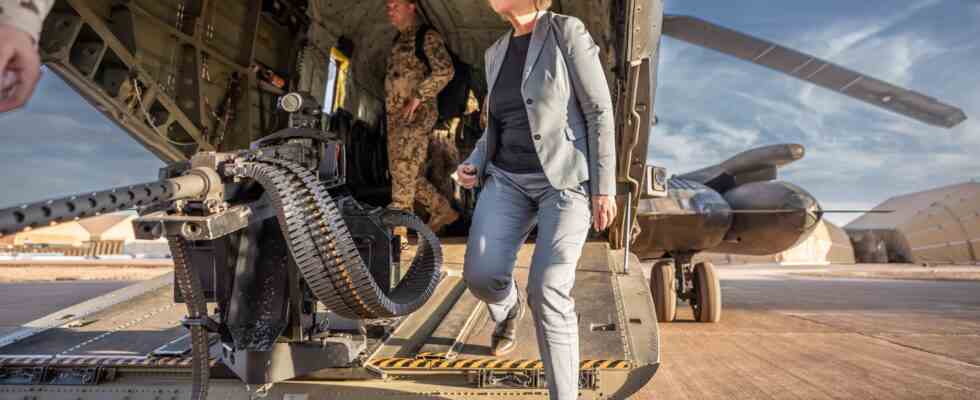Status: 12/15/2022 9:18 p.m
Lambrecht only reluctantly agreed to the deployment of the Bundeswehr in Mali until 2024. The schedule is subject to conditions. Crossing this red line could also have domestic political consequences.
The scenery leaves no doubt that this is a visit to the crisis area: while the German defense minister and her Malian counterpart walk through the line of honor of the soldiers standing to attention, hooded military personnel armed with assault rifles secure the minister in open, sand-colored pick-up trucks all cardinal directions.
“There’s no question that it’s dangerous here,” confirms a major who works here in the capital, Bamako, for the UN mission MINUSMA. The soldiers only leave the secured camp in armored vehicles. “A certain level, a certain tension is always there,” says the major.
Both the freedom of movement and the security situation here in the capital can in no way be compared with the north of the country, where the terrorist militias of the so-called ‘Islamic State’ control areas of the country. Here the around 1,100 soldiers of the Bundeswehr stationed in Gao have to deal with completely different dangers: gunfire, booby traps.
Lambrecht demands elections
The fact that the military junta has repeatedly prohibited the Germans from flying surveillance drones around the camp in recent weeks is of little benefit to their own security. This should have strengthened the traffic light coalition in its recent decision to withdraw from Mali. Although not immediately: “It will start in the summer of 2023 and should finally be completed in May 2024,” confirmed Defense Minister Christine Lambrecht in Bamako.
And sent an unmistakable warning to the Malian counterpart Sadio Camara who was standing next to her. The schedule is subject to conditions: “This includes that there will really be elections in February 2024 as part of this transition process.” That is condition number one. The regime that came to power in a coup had repeatedly promised to hold presidential elections.
Reconnaissance flights are necessary
Condition number two is that the Bundeswehr is also able to carry out reconnaissance flights, in other words: that the Heron drone is actually allowed to take off in Gao, Lambrecht continued. Probably out of consideration for the Russian mercenaries with whom the regime works and who are reluctant to scout out, the military government prohibited precisely these launches.
But clarification is essential, Lambrecht im ARD-Interview once again clearly: “We will not stay here until May 2024 if we cannot fulfill this task.”
It’s no secret that the SPD politician would have preferred to withdraw the Bundeswehr sooner – but Annalena Baerbock’s Foreign Ministry opposed this, also out of consideration for the United Nations. If the military regime now crosses Lambrecht’s red lines, it could again lead to explosive matters with the State Department.
First meeting with Camara
For the time being, however, Lambrecht’s Malian counterpart, Camara, tried to allay concerns that the Germans might no longer be welcome in the country. Rather, he praised the traffic light decision, having chosen May 24 as the withdrawal date, and Camara speaks of “openness and honesty” in the partnership.
For Lambrecht and Camara it was the first time that the two met face to face. The minister was not available when Lambrecht last visited in April.
Christmas greetings at 35 degrees: Christine Lambrecht visited the German soldiers at Camp Castor in Mali.
Image: dpa
Christmas message at 35 degrees
Lieutenant Lasse is particularly and personally affected by the Malian refusal to allow German drones to be launched. He is responsible for operating the four Heron reconnaissance drones at Camp Castor in Gao, northern Mali: “As a pilot, you want to fly.” Lasse makes no secret of his disappointment. As he speaks, he stands in front of a copy of the drone that he has just presented to the minister.
After her visit to the capital, Bamako, she was flown to the UN mission camp in Gao, where the Bundeswehr is also stationed. The warning sent to the Malian military government was followed by a Christmas message – dedicated to the German troops who are currently serving in the Bundeswehr’s most dangerous foreign mission.
“Especially at this time, before Christmas, it is so important for you to know that we have your back,” said Lambrecht. Delivering a Christmas message at over 35 degrees Celsius and in the reddish-brown desert sand must have been an unusual experience for the minister.
Lambrecht in Bamako conditions
Kai Küstner, ARD Berlin, 12/15/2022 4:28 p.m

